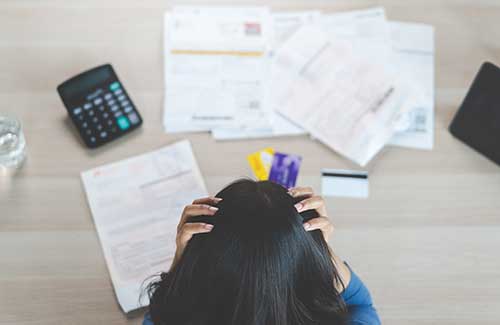What is Unsecured Debt?
Unsecured debt is defined as debt that does not have collateral backing it. The collateral acts as a form of security to the lender, backing the debt and able to be repossessed in the case of non-repayment from the loan borrower.
Unsecured loans that are not backed by assets, such as a car or house, tend to have higher interest rates when compared to secured loans because they pose a higher risk to the lender.
Examples of Unsecured Debt
Common examples of unsecured debt include:
- Credit card debt
- Medical bills
- Utility bills
- Student loans
- Income taxes
Types of Unsecured Loans
Unsecured loans come in a number of different forms. The most common types of unsecured loans include:
- Personal Credit Lines – While lines of credit are offered by many lenders in a secured form, many are also offered as unsecured loans that are not backed up by any asset. An unsecured personal credit line allows the borrower to access funds on an as-needed basis.
- Unsecured Personal Loans – Personal loans are offered by financial institutions for a wide number of intended uses. Since most personal loans are unsecured, they are one of the most common types of unsecured loans.
- Unsecured Student Loans – Nearly all government-backed student loans and many from private lending institutions fall under the category of unsecured loans.
- Unsecured Credit Accounts – With most credit card lines not requiring a backing in collateral, a majority of credit cards are unsecured. These types of unsecured loans offer the borrower a certain amount of monthly spending allowance that must be paid back to the lender on a revolving basis.
Unsecured Debt FAQs
Do you have to pay off unsecured debt?
There is a lot of confusion surrounding the topic of unsecured debt. Some believe you have to pay off this type of debt immediately, while others think you can ignore it. The truth is, there is no right or wrong answer when it comes to unsecured debt. It ultimately depends on your circumstances and what you feel comfortable with. It may be in your best interest if you can pay off your unsecured debt. This will help improve your credit score and give you peace of mind. However, if you struggle to make your payments, it may be best to focus on other debts first. There is no right or wrong answer when it comes to unsecured debt. It ultimately depends on your circumstances and what you feel comfortable with.
How do I get rid of unsecured debt?
Getting rid of unsecured debt can be complicated, but it is not impossible. There are a few things that you can do to make the process easier and improve your chances of success. The first thing that you need to do is create a budget. This will help you to see where your money is going and where you can cut back. It is also essential to ensure that you make all of your payments on time. If you are behind on any of your payments, it will be challenging to catch up. So, make sure you are current on your payments before you try to negotiate with your creditors.
What is the Difference Between Unsecured Debt and Secured Debt?
While both unsecured debt and secured debt involve borrowing money, there are some fundamental differences between these two types of financial obligations. Unsecured debt refers to debts that are not secured by collateral or anything else of value besides your promise to pay back the loan. Examples of unsecured debt include credit card debt, medical bills, and student loans. Secured debt, on the other hand, comes with some kind of physical asset as collateral for the loan in case you fail to pay back what you owe; this could be anything from a car or boat to your home mortgage loan.
What kind of unsecured debts can be settled?
Debt Settlement programs focus on unsecured debts – those that are not tied to a physical asset such as a house, car or boat. But not all types of unsecured debt qualify for settlement.
You can include the following types of debt in a New Era Debt Settlement Program:
- Credit cards
- Department store cards
- Signature loans
- Personal lines of credit
- Old repossessions
- Other unsecured debts
- Old judgments
- Private student loans in default
The following types of debt do not qualify:
- Home mortgages
- Federal student loans
- Car loans
- Other secured debts
- Credit Union debts
This list is not all-inclusive. Be sure to check with your New Era debt counselor.

